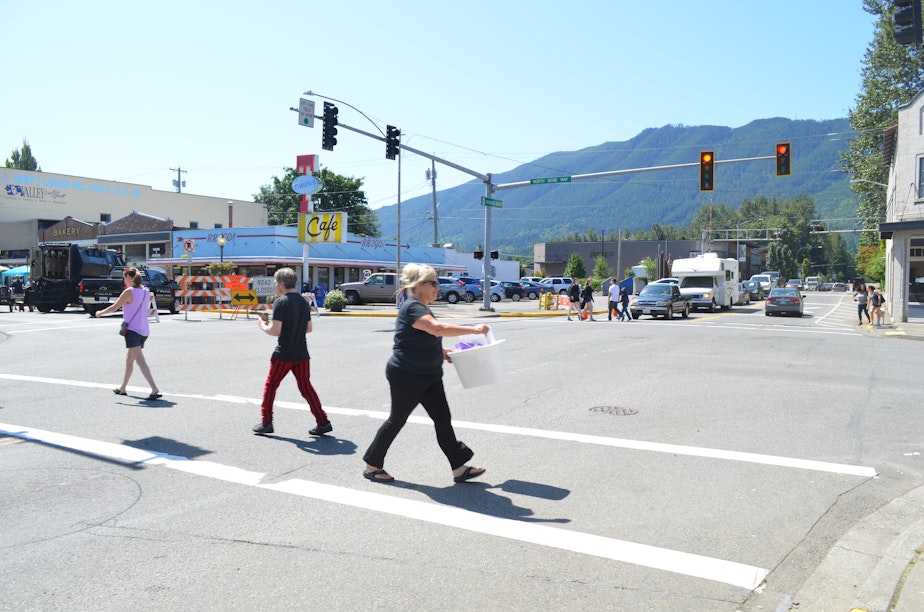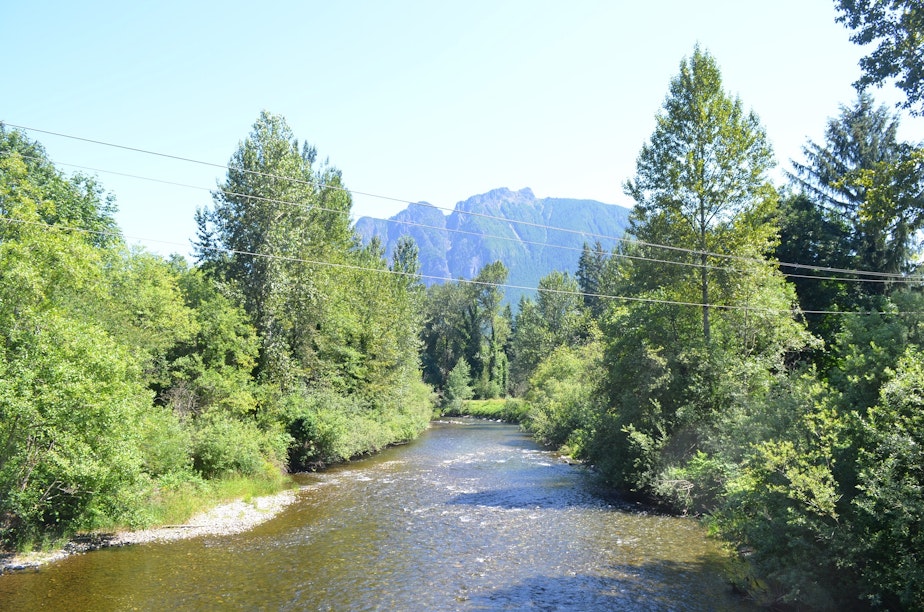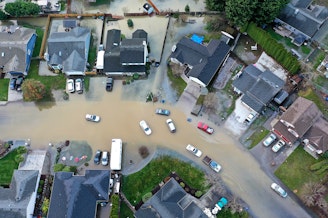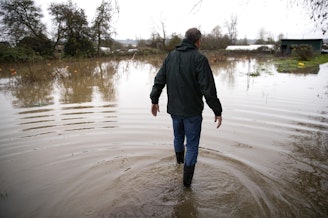The river runs alarmingly low in North Bend, due east of Seattle

It’s been raining this July, but much of Washington is still in a drought, because of our hot, dry spring and early summer.
Just 30 minutes outside Seattle, in the town of North Bend, most development is on hold till an issue of water is resolved.
On a sunny Saturday, long lines of cars waited for the light to change at the intersection of North Bend’s main streets. Signs advertising new homes lined the sidewalk.
The population of North Bend has nearly tripled over the last 30 years, and more than eight times as many people now live in the city of Snoqualmie as did in 1990.
All those people need water.
“It turns out that North Bend, Washington, relies on water from one spring and one well,” said Nick Bond, the state climatologist. “They can draw only a certain amount from that.”
That’s because the spring and well where North Bend gets its water are in the Snoqualmie River watershed. If the river drops below a certain level, the city has to stop using water or replace all the water it takes with water it buys from a different watershed.

With this year’s drought, the river is already low.
“Flows right now on the Snoqualmie are about half of what they usually are for this time of year,” Bond said earlier this month.
“Anticipate that, as we get later into summer that, yeah, there could be some real problems there.”
Bond said climate change will bring more summers like this, with prolonged droughts. Those will compound the problems North Bend is already having.
The city of North Bend and a co-op are the water utilities. The co-op has allocated all its water and can’t take on new customers.
Sponsored
That’s left dozens of projects in the commercial and multi-family zones of the city in the lurch until a water solution can be worked out.
“There are some folks who have projects approved in that area, one of which is the 212-unit apartment project,” said David Miller, North Bend’s planning director.
He said the apartment building couldn’t get the water permits it needs to proceed, because it’s in the co-op’s territory.
Miller said there is plenty of water; it’s just a dispute between the city and the co-op. But part of the reason the two water providers can’t come to an agreement is they can’t agree on how to mitigate their impact on the river.
The Snoqualmie River is so shallow right now you could probably walk across it on this stretch above Snoqualmie Falls.

The Snoqualmie Tribe has traditionally lived on the river’s banks and has a deep cultural attachment to these waters.
“Our falls are unique and they are sacred place of creation for not just our tribe but for peoples of the Northwest,” said Lois Sweet Dorman, a tribal elder. “When people come here we believe that they are responding to that spirit of Snoqualmie Falls and they are strengthened by this connection.”
But she said development and a changing climate are making it harder on streams that support salmon.
The Snoqualmie River has runs of chinook, coho, and pinks.
The Tulalip Tribe is also worried about the salmon on the Snoqualmie. They have a treaty right to fish the river.
Sponsored
Daryl Williams is a Tulalip member who’s worked on water issues for decades. He said climate change, the straightening of the river and loss of trees along its banks are to blame ... and also the sheer amount of water being taken out of the river.
“As we have more people moving into the area, there's more water coming out of our rivers and our groundwater systems that feed the rivers,” Williams said. “Somehow we need to get more water back into the river.”
Williams said that doesn’t mean all development has to come to an end.
“We need to do a better job of growing trees along the river to shade the rivers and streams,” Williams said. “Logjams can help store water behind them.”
Williams said he also believes that artificial solutions, like capturing and storing heavy spring flows, could help.
Sponsored
North Bend is already taking some of those steps.
The city has mandated an 115-foot buffer, requiring landowners to plant more trees and keep houses back from the riverbank.
And there’s a water conservation bill in front of the city council that proponents say could offset the water needs of all these newcomers.
And that could help the longtime residents of the Snoqualmie River: salmon.
Correction, 9:30 a.m., 8/1/2019: Lois Sweet Dorman is a Snoqualmie Tribe elder. Because of an editing error, a previous version of this story incorrectly referred to her status.




